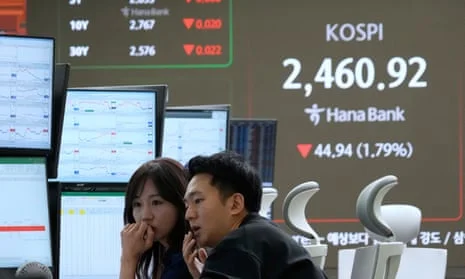
Trump’s Tariff Hikes Shake Asian Markets
President Donald Trump's recent announcement of substantial tariff increases on imports has triggered a significant downturn in Asian stock markets. The Nikkei and ASX indices saw declines, reflecting investor concerns over the potential escalation of trade tensions. The move, aimed at protecting domestic industries, has particularly impacted technology sectors, Japanese banks, and suppliers like Nike in Asia.
The ripple effect of Trump's tariff policy was evident as markets in Asia grappled with the news. Stocks of major tech companies and financial institutions in Japan and Australia took a hit, with investors worried about the broader implications for global trade. Analysts are closely monitoring the situation, as the tariff hikes could lead to retaliatory measures from affected countries, potentially sparking a new trade war.
The decision comes at a time when global economic recovery is still fragile, raising questions about the long-term impact on international trade relations and economic growth. As tensions rise, stakeholders from various sectors are calling for a more balanced approach to trade policies to mitigate the risks of further market instability.
Related issues news
What is a reciprocal tariff plan?
Reciprocal Tariff Policy. It is the policy of the United States to rebalance global trade flows by imposing an additional ad valorem duty on all imports from all trading partners except as otherwise provided herein.
How bad are tariffs?
The wasteful effects of protectionism eventually lead to a substantial reduction in the efficiency with which labor is used, leading to a decline of about 0.9% of labor productivity after five years. Tariffs also lead to a small and marginally-significant increase in unemployment.
Does the European Union have tariffs on US goods?
EU countermeasures will include reinstating suspended tariffs on U.S. goods and adding higher counter-tariffs to a range of products including agriculture and food, clothing, furniture, household appliances, construction, steel, cars and car parts and precious metals, they added.
Does China charge the US tariffs?
So far, China has either imposed or proposed tariffs on $110 billion of U.S. goods, representing most of its imports of American products.